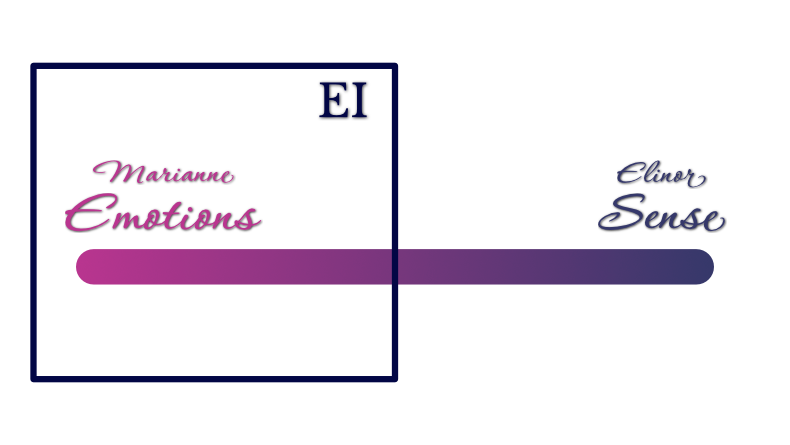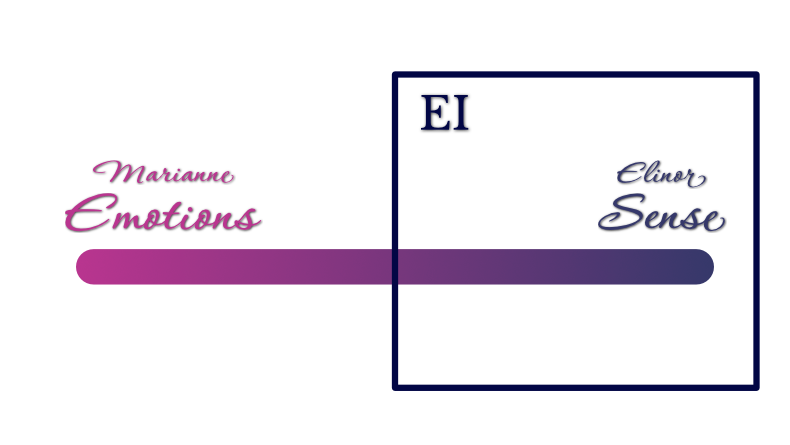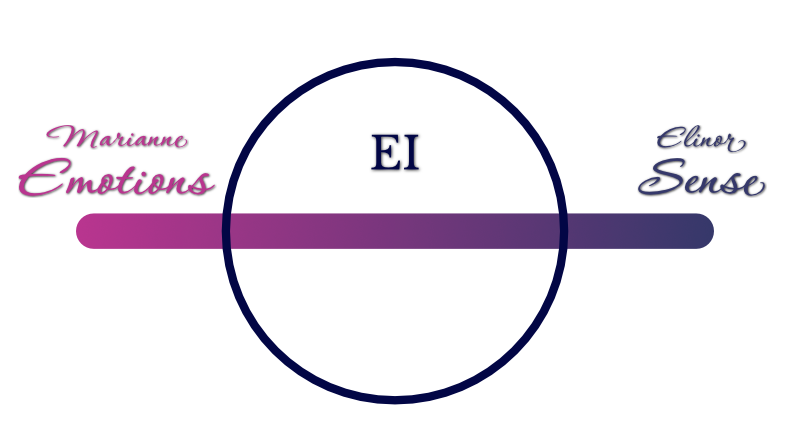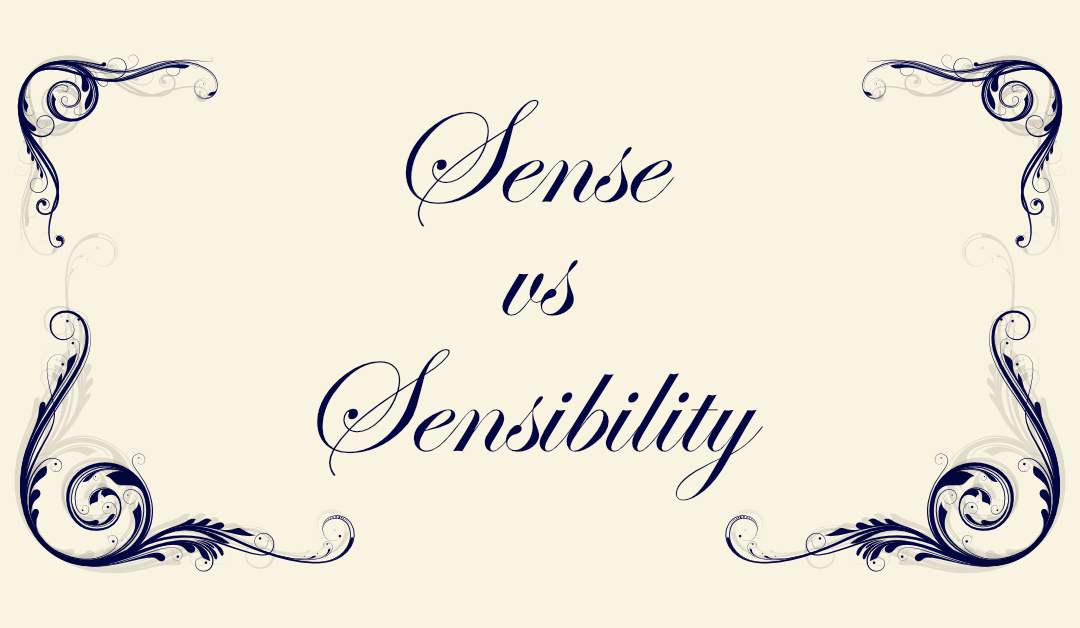I recently re-read Jane Austen’s Sense and Sensibility. I have read most of her novels several times, because I change so the novel changes too. When I read the book for the first time, I thought to myself that Elinor Dashwood was the perfect role model: Poised, calm under stress, always in control of her feelings.
That’s what I should be like, I told myself. I also used to think that all that emotions stuff was about being like Marianne Dashwood, Elinor’s sister, who is constantly at the whim of her feelings. Now that I know what Emotional Intelligence is, I see things a bit differently.
Warning: This post contains major spoilers for Sense and Sensibility. Check out the Wikipedia page if you want to read a comprehensive plot summary first.
Sensibility
“[Marianne] was without power, because she was without any desire of command over herself.”
Sounds exactly as bad as it turns out for her. Marianne is only sixteen when she falls head over heels in love with Willoughby. At first, everything goes great. He matches her enthusiasm, they are both equally attractive and he falls in love with her too.
Unfortunately, Willoughby is a libertine, aka a man who sleeps around, which at Austen’s time was a bad thing. No one knows this at first, so when Willoughby pulls back from Marianne because his rich aunt found out about his shenanigans and cut him off financially, everyone, including herself, makes up excuses for his behaviour.
Meanwhile, Marianne gives in to every emotion. She even isolates herself from family and friends, so they won’t distract her from wallowing. She is quite determined to make the most of her feelings.
“Marianne would have thought herself very inexcusable had she been able to sleep at all the first night after parting from Willoughby.”
At a party, she even hunts him down making a fool of herself. When she realises that Willoughby will marry another woman she almost dies from the grief. By the end of the novel Marianne has learned to be more like Elinor and is given a very questionable happy end as a “reward”.
Why? Because Austen wanted to make a point: Giving in to your emotions to excess is dangerous and leads to ruin. Not just for Marianne. Willoughby ends up married to a jealous woman who makes his home life miserable. These two are Austen’s “what not to do” examples.
Unlike Elinor.
Sense
“[Elinor] had an excellent heart; her disposition was affectionate, and her feelings were strong; but she knew how to govern them (…)”
When Elinor is also disappointed in love, she hides her strong feelings from her family. She even rejoices in her ability to make light of her suffering, so she won’t burden others. Elinor stays busy and distracts herself when Edward, the man she hoped to marry, does not propose.
Eventually, she learns that Edward has been secretly engaged to another woman for years. How does she react? By thinking about it. Elinor is always in control. Austen rewards her calm through the story because Elinor gets her man.
Austen’s point is clear: Be like Elinor. She was the example women should follow.
Austen’s time
In the context of Austen’s time, this made perfect sense. If a woman got a bad reputation (which was ridiculously easy) and on top of that was as poor as Marianne and Elinor are, she would end up unmarriable.
There’s a side character, a young girl Willoughby has seduced and left pregnant. He refuses to marry her which is why his aunt cuts him off. This could easily have been Marianne’s fate if things had gotten further between them. That girl has to spend the rest of her life hidden away in the country.
By using this extreme example, Austen shows that Marianne had a narrow escape. Why? To drive home her point: Don’t be like Marianne.
The two sisters are deliberately placed at opposite ends of the spectrum of emotional expressiveness.

On the left you have Marianne who shows every emotion and even argues that suppressing or hiding feelings is unnatural.
On the right is Elinor who in Austen’s words “governs” her emotions. While Austen’s message is obvious, be like Elinor, it’s important to understand that that is not what Emotional Intelligence is about.
About EI
Some people hear Emotional Intelligence and think of the Mariannes of the world. Touchy feely stuff. Being like Marianne. Feeling every emotion deeply, even wallowing in feelings. Holding on to them. Act on every impulse.

Others think that EI means being like Elinor. Always in control. Sure, you have feelings but you don’t show them. No need to listen to your emotions and definitely don’t act on them!

I used to be one of the latter people. EI I thought was all about turning into a super-calm, always poised Elinor. Never making a bad decision, never showing weakness. Always doing the right thing, stoically weathering every blow life dealt.
But even when I read Sense and Sensibility years ago, I struggled with that attitude. Why? Because Elinor, let’s face it, is a bit boring.
Yes, of course I rejoice every time she gets her Edward. But my favourite scene in the entire book is when Edward comes to visit, and Elinor realises that Edward’s former fiancé has married his brother. Edward is free to marry Elinor. The dam breaks. Elinor runs out of the room, crying with joy.
(If you haven’t watched Sense and Sensibility (1995) directed by Ang Lee and starring Emma Thompson as Elinor, I highly recommend it. That scene alone is a pure treat!)
I finally connect with because that’s something else emotions are for. They connect us to other people. That’s why this scene makes Elinor so likeable. We realise how much she must have suffered all this time. So does her mother:
“[Mrs Dashwood] feared that under this persuasion she had been unjust, inattentive, nay, almost unkind, to her Elinor; that Marianne’s affliction, because more acknowledged, more immediately before her, had too much engrossed her tenderness, and led her away to forget that in Elinor she might have a daughter suffering almost as much, certainly with less self-provocation, and greater fortitude.”
By showing our feelings, sharing especially the negative ones with others, we form deeper connections.
Our time
These days unmarried mothers no longer have to hide in the country and the Willoughbys of the world can earn their own living. Yet, so many people still believe that Emotional Intelligence means controlling and suppressing your feelings.

But the truth is that EI lies somewhere in-between. Sense and emotions are not mutually exclusive. On the contrary. Emotional Intelligence skills help us make sense of our emotions, teach us how to be in tune with our feelings and feel them without wallowing.
When you know how you feel at any given moment, when you are self-aware, you can decide if you want to act on a feeling or simply let it pass. It’s not about letting lose. It’s not about control.

EI skills allow you to live in tune with your emotions, so you can make concious choices about your decisions and your actions and can connect to the people around you.
EI is not about being a Marianne or an Elinor. It is about being you.
